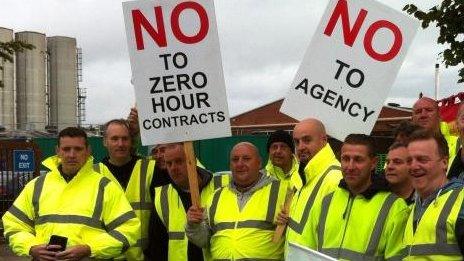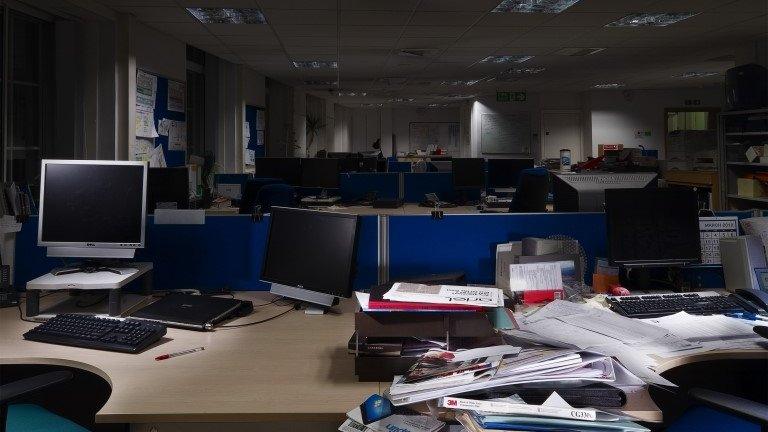UK firms used 1.8m zero-hours contracts, says ONS
- Published

Some workers are unhappy about zero-hours contracts but others say it suits them
Firms in the UK used 1.8 million zero-hours contracts at the height of last summer, official statistics show.
The total, external, in the first two weeks of August, was higher than the 1.4 million contracts revealed when figures were first collected in January last year.
This is likely to be the result of a number of seasonal industries using more of these contracts, making a direct comparison difficult.
Zero-hours contracts do not guarantee a minimum number of hours of employment.
Some workers and unions are unhappy that staff can simply be sent home if there is no work to be done. But supporters of the contracts like the flexibility that they can offer.
Awareness

The retail sector is one that often uses zero-hours contracts
Additional data from the Office for National Statistics (ONS) showed that 697,000 workers said they were on a "zero-hours contract" in their main job between October to December last year.
This represents 2.3% of all people in employment.
This figure, collected in a survey, is reliant on these workers being fully aware that they are on a zero-hours contract.
The ONS said that a rise on the 586,000 workers who said they were on zero-hours contracts during the same period in 2013 could be the result of greater awareness and publicity for these kind of contracts.

Zero-hours contracts explained
One in five employers has at least one employee on a zero-hours contract
Staff have no guaranteed hours
The contracts are often used in retail and in the hospitality sector

David Freeman, of the ONS, said that some of the greater awareness of zero-hours contracts was among people who had been in these types of jobs for more than a year.
On average, someone on a zero-hours contract usually worked 25 hours a week, the ONS said. The majority were women and students, often aged under 25 or 65 and over.
About a third of them wanted more hours, primarily in their current job, compared with 10% of other people in employment.
TUC general secretary Frances O'Grady said: "Zero-hours contracts sum up what has gone wrong in the modern workplace. They shift almost all power from the worker and give it to their boss."
Chuka Umunna, Labour's shadow business secretary, said: "Ministers have watered down every person's rights at work and zero-hours contracts have gone from being a niche concept to becoming the norm in parts of our economy."
But Business Secretary Vince Cable said: "Zero-hours contracts are valued by many employers and individuals who want flexibility in the hours they work, such as students, people with caring responsibilities and those who want to partially retire.
"However, historically there has also been some abuse in these types of contracts."
The government is ensuring rules mean that employers cannot tie workers down exclusively to their zero-hours contract. They should allow these workers to take up employment elsewhere too.

Analysis: Anthony Reuben, head of statistics, BBC News
These figures are more frustrating than enlightening.
We know that the number of people saying they have a zero-hours contract has risen, but maybe they just did not know before. Remember that 45% of the increase was from people who had worked with such contracts for more than a year, suggesting that awareness was a big issue.
As for the figures from asking employers, there is little point comparing January figures for such contracts with August figures because industries such as retail, agriculture and hospitality have huge seasonal variations. So some politicians and pressure groups may say that the number of people on zero hours contracts has risen, but we do not really have the statistics to back that up.

Are you on a zero hours contract? What has your experience of it been? You can email haveyoursay@bbc.co.uk, external with your experience. Please include a telephone number if you are willing to be contacted by a BBC journalist.
- Published1 April 2015

- Published25 June 2014

- Published30 April 2014

- Published25 April 2014
